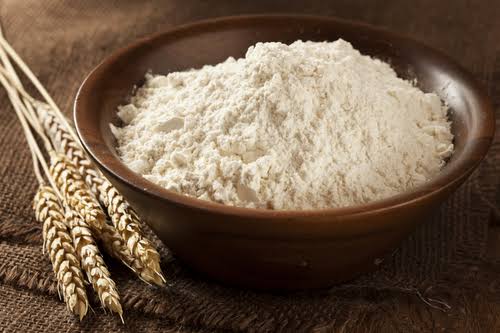Wheat flour is flour milled from the entire kernel of wheat. There are two types of wheat flour, soft wheat flour and hard wheat flour. Soft wheat flour has ery low gluten content, while hard wheat flour contains high gluten content. Wheat flour is used for many consumption purposes all over the world. In Nigeria, wheat flour is also used as a swallow to eat with delicious soups. This article discusses the health benefits of wheat flour.
However, let us first examine the nutritional value of wheat flour.
Nutritional Value of Wheat Flour
Wheat flour is high in carbohydrates, dietary fiber and protein. However, it is low sugar and fat. 100 grams of wheat flour contains approximately 360 calories.
The following are the amount of minerals and vitamins present in 100 grams of wheat flour.
| Vitamins | Quantity |
|---|---|
| Thiamine (B1) |
0.447 mg |
| Riboflavin (B2) |
0.215 mg |
| Niacin (B3) |
6.365 mg |
| Pantothenic acid (B5) |
1.008 mg |
| Vitamin B6 |
0.341 mg |
| Folate (B9) |
44 μg |
| Minerals | Quantity |
|---|---|
| Calcium |
34 mg
|
| Iron |
3.88 mg
|
| Magnesium |
138 mg
|
| Manganese |
3.8 mg
|
| Phosphorus |
346 mg
|
| Potassium |
405 mg
|
| Sodium |
5 mg
|
| Zinc |
2.93 mg
|
Health Benefits Of Wheat Flour

1. Controls obesity
Although wheat is proven to help people lose weight, women benefit from it significantly more than men. Therefore, regularly consuming whole wheat products can greatly aid individuals with obesity and lead to significant weight loss.
2. Boosts digestive health
Wheat flour is rich in dietary fiber, and bran. Studies suggests that components of wheat bran act as prebiotics, and feed some of the healthy bacteria in your gut. Eating wheat flour may also boost digestive health by preventing constipation.
3. Prevents colon cancer
Colon cancer is one of the most common cancers that affects the digestive system. Medical studies have indicated that consumption of whole grains, such as wheat flour might help in preventing colon cancer. Eating foods that are rich in fiber such as wheat flour can significantly reduce the risk of colon cancer.
4. Improves body metabolism
When your body’s metabolism isn’t working correctly, you can develop a range of metabolic disorders. In addition, high blood pressure and low HDL cholesterol levels are among the most prevalent. Patients may be at risk of developing cardiovascular disease due to these factors.
This is why most doctors advise including whole wheat grains in your diet. Wheat helps to enhance your general digestion, leading to better metabolism.
5. Prevents type 2 diabetes
While type 2 diabetes is a chronic disorder that can be deadly if not properly managed, it is also a condition that is controllable by paying closer attention to one’s diet. Magnesium is one of the components abundantly available in wheat.
This mineral functions as a cofactor for approximately 300 enzymes that influence how the body processes insulin and expels glucose. As a result, eating whole wheat daily aids with blood sugar regulation. People with diabetes can effectively control their blood sugar levels by simply substituting wheat for rice in their daily diet. The glycemic index of wheat flour is 54, which makes great for people who want to control there sugar intake.
6. Minimizes chronic inflammation
Chronic inflammation is defined as any inflammation that lasts for more than a few months. It can be caused by various factors, including a reaction to toxic stimuli or an immune system imbalance. Though it may not appear to be a significant issue, it can lead to some types of cancer and even rheumatoid arthritis if left untreated.
Thankfully, chronic inflammation is a condition that wheat flour can help with. In addition, wheat includes betaine, which aids in the treatment of Alzheimer’s disease, type 2 diabetes, cognitive decline, osteoporosis, and heart disease, among other maladies.
7. Prevents gallstones
You can also consume wheat to prevent gallstone complications. Gallstones are generated when bile acids are secreted in excess. Wheat’s insoluble fiber enables smoother digestion, necessitating less bile acid release, preventing gallstones.
Bottom Line
Wheat is one of nature’s gifts to man. These health benefits of wheat flour attest to that. However, if you’re unsure about your thoughts with consuming wheat flour, do well to consult with your doctor.
ALSO READ:
- 5 Solid Health Benefits of Akpu (Fufu)
- 5 Super Health Benefits of Agidi (Eko)
- 7 Valid Health Benefits of Pounded Yam
- 6 Yummy Health Benefits of Semolina (Semovita)
- 7 Potent Health Benefits of Nigerian Pear (Ube)
- 6 Awesome Health Benefits of African Velvet Tamarind (Icheku)
- 5 Marvellous Health Benefits of Uziza Leaves and Seeds
Collins Nwokolo is a human physiologist, writer and health enthusiast. He loves writing helpful articles on health and fitness, which he enjoys sharing with everyone.





